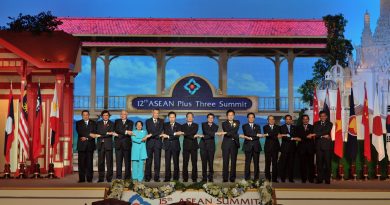FOCUS on Uruguay Faces Runoff in Presidential Election
Uruguay Faces Runoff in Presidential Election
Joseph Brennan
Managing Editor
On November 23, Uruguay will host runoff elections after no presidential candidate received a majority of the votes during the initial round of voting. As Uruguay heads into the final round of its 2024 presidential election, The Associated Press says all eyes are on the showdown between two political candidates: Yamandú Orsi, representing the left-wing Broad Front (Frente Amplio), and Álvaro Delgado, the candidate for the center-right National Party (Partido Nacional). The runoff follows a highly contentious first round in October, where neither candidate was able to secure the required 50 percent of the vote. Now, both contenders are racing to win over undecided voters and sway key regional and political blocs in a contest that could reshape Uruguay’s political future.
The first round of voting on October 27 saw Orsi emerge with a slight lead, securing 43.2 percent of the vote, while Delgado followed closely behind with 28 percent, according to Al Jazeera. This has set the stage for a runoff as the candidates focus their efforts on appealing to the center and independent voters who remain undecided. In addition, the election has sparked intense debates about Uruguay’s economic direction, social policies, and its position in an increasingly polarized Latin America. Al Jazeera further states that for Orsi, the path to victory hinges on the left-wing base and attracting progressive independents who may have been turned off by the National Party’s conservative social policies. Reuters alludes to how Delgado’s challenge is to appeal to disaffected voters from both the left and the right who are seeking solutions to Uruguay’s economic challenges, particularly high inflation, and sluggish growth.
Yamandú Orsi, who is a former presidential chief of staff, is a seasoned politician with deep ties to the left-wing Broad Front, the political coalition that has governed Uruguay for the past 15 years, writes The New York Times. Orsi represents a more moderate, conciliatory wing of the coalition, though his platform includes a commitment to the progressive social policies and welfare programs that have defined the Broad Front’s leadership. These include strengthening public health and education, expanding labor rights, and addressing climate change through green energy investments.
Uruguay’s political landscape has shifted dramatically over the past decade. Since 2005, the country was led by the Broad Front, which turned Uruguay into one of the most progressive countries in Latin America in terms of social policy. However, in 2019, the Broad Front lost power to the National Party, a coalition that brought Luis Lacalle Pou to the presidency, writes Map of the World. Lacalle Pou’s administration ushered in a more market-oriented approach, reducing some social benefits, and implementing austerity measures aimed at tackling Uruguay’s growing debt. The economic challenges of the Lacalle Pou government, particularly rising inflation, and fiscal pressures, have fueled discontent, providing fertile ground for Orsi’s candidacy to tap into concerns about inequality and social justice.
The result has been a polarized electorate, with voters increasingly divided along ideological lines. While Orsi benefits from the nostalgia for the Broad Front’s progressive legacy, Delgado represents a desire for change, particularly regarding economic management and security issues. With just a few weeks left before the runoff, both candidates are racing to convince the electorate that they are the best option to guide Uruguay through these turbulent times.
One of the defining issues of the 2024 election has been Uruguay’s economic trajectory. After several years of sluggish growth, particularly in the aftermath of the COVID-19 pandemic, the economy in 2023 grew by .4 percent and has been increasing ever since, per the World Bank. Uruguay’s fiscal deficit remains a point of contention, with Orsi advocating for a more welfare-oriented approach and Delgado calling for austerity and reforms to public spending.
Another flashpoint in the election is security. Uruguay, once known for its relatively low crime rates, has seen a rise in organized crime and violence in recent years. InSight Crime writes that Delgado’s tough-on-crime rhetoric has found resonance with voters concerned about the growing insecurity in urban areas, while Orsi has focused more on root causes like poverty and inequality, positioning himself as the candidate who will promote social inclusion as a way to address crime.
Finally, foreign policy and Uruguay’s relationship with its neighbors, especially Brazil and Argentina, are playing a subtle but important role in the election. Both candidates have nuanced approaches to these relations, with Orsi emphasizing diplomacy and integration within Mercosur, while Delgado leans toward a more pragmatic, trade-oriented stance, focusing on economic cooperation.
Image courtesy of Getty Images


